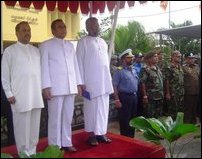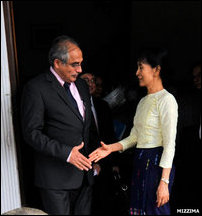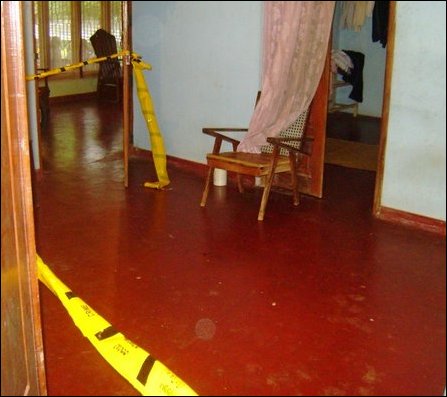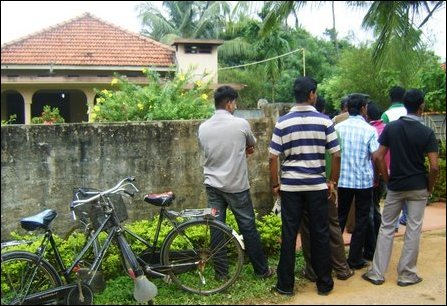A Brief Colonial History Of Ceylon(SriLanka)
Search This Blog
Friday, December 31, 2010
Youth abducted, Sri Lanka colonial commander denies knowledge
[TamilNet, Friday, 31 December 2010, 01:07 GMT]
Unidentified persons coming in a white van abducted a youth in Urumpiraay, Jaffna, in broad daylight and in public, while he was riding a bicycle Thursday. When contacted by media over the incident, Sri Lanka’s colonial commander in Jaffna, Maj. Gen Hathurusinghe not only denied any knowledge of it, but also said that there are no chances for such abductions since the LTTE doesn’t exist now. When it was pointed out that public had witnessed the abduction and that the bicycle and slippers of the victim had been remaining on the street, the ‘Asian Nobel laureate’ General replied that the police would investigate into that matter. However, the police that picked up the evidence also denied any abduction. Meanwhile, irresponsible reporting of the happenings in Jaffna by some in the diaspora affects the credibility of even bona fide news, commented media circles in Jaffna. Full story >>>.
Unidentified persons coming in a white van abducted a youth in Urumpiraay, Jaffna, in broad daylight and in public, while he was riding a bicycle Thursday. When contacted by media over the incident, Sri Lanka’s colonial commander in Jaffna, Maj. Gen Hathurusinghe not only denied any knowledge of it, but also said that there are no chances for such abductions since the LTTE doesn’t exist now. When it was pointed out that public had witnessed the abduction and that the bicycle and slippers of the victim had been remaining on the street, the ‘Asian Nobel laureate’ General replied that the police would investigate into that matter. However, the police that picked up the evidence also denied any abduction. Meanwhile, irresponsible reporting of the happenings in Jaffna by some in the diaspora affects the credibility of even bona fide news, commented media circles in Jaffna. Full story >>>.
Thursday, December 30, 2010
Sri Lanka bans BBC again from war inquiry panel
But the BBC correspondent and a number of Sri Lankan journalists were turned away at the prison gates.
The 26-year conflict ended in May last year with victory for government forces over the Tamil Tiger separatists.
 .
.Wednesday, December 29, 2010
Terror campaign in Jaffna: abducted youth tortured and beheaded
Terror campaign in Jaffna: abducted youth tortured and beheaded
[TamilNet, Wednesday, 29 December 2010, 21:27 GMT]Mahendran Thiruvarudchelvam, known as Chelvam, abducted 9 days ago was tortured and beheaded as evidenced by his remains reaching Jaffna Teaching Hospital. Even though initial reports said that he had been abducted for a ransom of 8 million, his background and prevailing terror campaign in the SL-military-occupied Jaffna point to deeper motives behind his killing, human rights activists in Jaffna said. Mr. Chelvam, 28-year-old, and father of a child, was living in Vanni to the end of the war, spent some time in the internment camp and was released for resettlement. He returned to his native place Meesaalai North near Kanakan-pu'liyadi and started doing business as a vehicle dealer. The former residents of Vanni, whether they are in captivity or released, are viewed by the occupying military and paramilitary as objects for exploitation and then extermination.. Full story >>
Tuesday, December 28, 2010
New Democracy- Sri Lankan Style:-‘Sri Lankan forces planned education officer’s assassination in Jaffna’
 1:38 Added to queue
1:38 Added to queue  Sri Lanka 'war crimes' video:
Sri Lanka 'war crimes' video:
'Disaster management' observed with Sinhala anthem in Jaffna
[TamilNet, Monday, 27 December 2010, 00:03 GMT]Sri Lanka president Mahinda Rajapaksa did not attend disaster management event (National Security Day), remembering Tsunami, took place this time in his colonial territory of Jaffna on 26th December.
'Disaster management' observed with
Wednesday, December 29, 2010
State-sponsored anti-Tamil violence in 1956, 1958, 1961, 1974
violence in 1956, 1958, 1961, 1974
 Sinhala anthem in Jaffna
Sinhala anthem in Jaffna
-
 7:52 Added to queue ( 1 Vote )Tuesday, 28 December 2010 13:06
7:52 Added to queue ( 1 Vote )Tuesday, 28 December 2010 13:06 New Left Front Leader Dr. Wickramabahu Karunaratne today lodged a complaint at the Human Rights Commission alleging that that he and his party members were attacked at the airport earlier this month after he arrived in the island from the UK FULL Full Story.
New Left Front Leader Dr. Wickramabahu Karunaratne today lodged a complaint at the Human Rights Commission alleging that that he and his party members were attacked at the airport earlier this month after he arrived in the island from the UK FULL Full Story.
 |
 .
. Monday, December 27, 2010
‘Sri Lankan forces planned education officer’s assassination in Jaffna’
Monday, December 28, 2010
‘Sri Lankan forces planned education officer’s assassination in Jaffna’
education officer’s assassination in Jaffna’
[TamilNet, Tuesday, 28 December 2010, 21:56 GMT]Sri Lankan forces occupying Jaffna planned the assassination of the Deputy Director of Education for Valikaamam, Mr. Markandu Sivalingam, on Sunday night, media sources in Jaffna said. “We cannot keep quiet seeing such murders. If we do so, tomorrow even we will not remain. We have to mobilise ourselves very urgently,” said Rev. Fr. Jesudas, the principal of St. Hendry’s College, I’lavaalai, speaking at the funeral of Mr. Sivalingam at Maruthanaamadam, Tuesday. It was attended by large number of students, teachers, principals and the public. But neither SL military officials, nor the officials of the provincial administration attended the funeral. On the day of his assassination there was the ‘disaster management’ gala attended by SL prime minister forcing students to ‘sing’ Sinhala anthem.

Obituary address by Rev. Fr. Jesudas at the funeral [Photo: TamilNet]Full story >>
============================================================================
============================================================================
Wednesday, December 29, 2010
State-sponsored anti-Tamil violence in 1956, 1958, 1961, 1974
violence in 1956, 1958, 1961, 1974
===========================

- Monday 12 July 2010
- Edward Mortimer: Local journalists who speak out against human rights abuses fear for their lives and the world press turns a blind eye Continue reading...

Lasantha Wickrematunge lies in state during his funeral ceremony in Colombo. Photograph: Lakruwan Wanniarachchi/AFP/Getty Images=============================
BBC HARD talk : Democracy Sri Lankan-Style : June 2010 3 of 3
BBC HARD talk - Democracy Sri Lankan-Style: June 2010 2 of 3
 7:52 Added to queue
7:52 Added to queue  9:12 Added to queue
9:12 Added to queue Zonal Deputy Director of Education shot dead in Jaffna
[TamilNet, Monday, 27 December 2010, 09:03 GMT]
 Armed men who arrived in a motorbike shot and killed 52-year-old Markandu Sivalingam, the deputy director of Education, Valikaamam Zone, Sunday night at his residence in Urumpiraay in Jaffna, sending shock waves across the education sector in Jaffna. The killing of a peaceful educationalist, who recently took up the post after serving at Koappaay Teachers Training College for a long time, has taken place when Sri Lankan military had maximum deployment in Jaffna as the SL Prime Minister was visiting the city on the occasion of a Tsunami remembrance event, forcing the Tamil students to sing Sri Lankan anthem in Sinhala. Mr. Sivalingam was shot at his chest around 10:30 p.m., Koappaay police said.
Armed men who arrived in a motorbike shot and killed 52-year-old Markandu Sivalingam, the deputy director of Education, Valikaamam Zone, Sunday night at his residence in Urumpiraay in Jaffna, sending shock waves across the education sector in Jaffna. The killing of a peaceful educationalist, who recently took up the post after serving at Koappaay Teachers Training College for a long time, has taken place when Sri Lankan military had maximum deployment in Jaffna as the SL Prime Minister was visiting the city on the occasion of a Tsunami remembrance event, forcing the Tamil students to sing Sri Lankan anthem in Sinhala. Mr. Sivalingam was shot at his chest around 10:30 p.m., Koappaay police said.
 Armed men who arrived in a motorbike shot and killed 52-year-old Markandu Sivalingam, the deputy director of Education, Valikaamam Zone, Sunday night at his residence in Urumpiraay in Jaffna, sending shock waves across the education sector in Jaffna. The killing of a peaceful educationalist, who recently took up the post after serving at Koappaay Teachers Training College for a long time, has taken place when Sri Lankan military had maximum deployment in Jaffna as the SL Prime Minister was visiting the city on the occasion of a Tsunami remembrance event, forcing the Tamil students to sing Sri Lankan anthem in Sinhala. Mr. Sivalingam was shot at his chest around 10:30 p.m., Koappaay police said.
Armed men who arrived in a motorbike shot and killed 52-year-old Markandu Sivalingam, the deputy director of Education, Valikaamam Zone, Sunday night at his residence in Urumpiraay in Jaffna, sending shock waves across the education sector in Jaffna. The killing of a peaceful educationalist, who recently took up the post after serving at Koappaay Teachers Training College for a long time, has taken place when Sri Lankan military had maximum deployment in Jaffna as the SL Prime Minister was visiting the city on the occasion of a Tsunami remembrance event, forcing the Tamil students to sing Sri Lankan anthem in Sinhala. Mr. Sivalingam was shot at his chest around 10:30 p.m., Koappaay police said. Sunday, December 26, 2010
New Left Front Leader Dr. Wickramabahu Karunaratne goes to HRC?
Bahu goes to HRC
Tuesday, 28 December 2010 13:06
 New Left Front Leader Dr. Wickramabahu Karunaratne today lodged a complaint at the Human Rights Commission alleging that that he and his party members were attacked at the airport earlier this month after he arrived in the island from the UK.
New Left Front Leader Dr. Wickramabahu Karunaratne today lodged a complaint at the Human Rights Commission alleging that that he and his party members were attacked at the airport earlier this month after he arrived in the island from the UK. Dr. Karunaratne said that his right as a Sri Lankan citizen to enter the country had been violated when he was assaulted on his return from the United Kingdom. “I will pursue the matter further,” he said.
Wickramabahu said that though he had complained to the authorities no action had been taken so far. “I complained to the IGP and the DIG of the air port police, they agreed to provide me and my party members with security but they have done nothing so far,” he said.
Dr. Wickramabahu was attacked at the airport after he returned from London after allegedly attending a LTTE (Liberation Tigers of Tamil Eelam) Mahaveer Day celebration in London were he made a speech at the
event. (Nabeela Hussain)

FULL Full Story
Saturday, December 25, 2010
'Disaster management' observed with Sinhala anthem in Jaffna
Sri Lanka president Mahinda Rajapaksa did not attend disaster management event (National Security Day), remembering Tsunami, took place this time in his colonial territory of Jaffna on 26th December. He was scheduled to preside over it according to earlier announcements. SL Prime Minister D.N. Jeyaratne substituted him and school students of Jaffna were ordered to ‘sing’ the SL anthem in Sinhala only for the occasion. The students clad in Tamil traditional dress, veaddi and chealai, said that they were never accustomed to sing the Sinhala anthem before, but were rigorously ‘trained’ in the last two days for it and were forced for the performance. The function, ignored by the public and participated mainly by officials, made SL minister Douglas Devananda to comment that public in future should be prepared for participation.
The security for the event was such that when the lone UNP parliamentarian from Jaffna, Vijayakala Maheswaran tried to enter the auditorium, she fell down when the presidential security forces pushed her aside. Mrs Maheswaran, a native of Jaffna, had to be identified by a Muslim minister from the south before getting her permission to enter. Full story >>
Tuesday, December 21, 2010
Nambiar, UN, undermine war crimes investigation on Sri Lanka, Burma
[Tue, 21 Dec 2010, 08:48 GMT]

 Unchecked for the role he played in the genocide of Eezham Tamils last year, Vijay Nambiar’s UN villainy is now targeting ethnicities struggling in Burma. The Burmese military now plans to adopt the Rajapaksa doctrine of military solution to the national question in Burma, with the backing of the same establishments that backed
Unchecked for the role he played in the genocide of Eezham Tamils last year, Vijay Nambiar’s UN villainy is now targeting ethnicities struggling in Burma. The Burmese military now plans to adopt the Rajapaksa doctrine of military solution to the national question in Burma, with the backing of the same establishments that backed 
Vijay Nambiar (left) mets recently released Burmese pro-democracy leader Aung San Suu Kyi on November 27, 2010 [Photo: Mizzima]
Saturday, December 18, 2010
US lawmakers urge Sri Lanka rights probe
 Fri Dec 17, 7:39 pm ET
Fri Dec 17, 7:39 pm ET
WASHINGTON (AFP) – Dozens of US lawmakers on Friday urged a global probe into alleged rights violations by Sri Lanka in the last stages of its civil war, saying Colombo's own efforts do not ensure accountability.In letters to Secretary of State Hillary Clinton, 17 senators and 30 members of the House of Representatives called for the United States to seek a United Nations role investigating last year's finale of the Tamil Tiger insurgency.
FULL STORY
Friday, December 17, 2010
US cable points to S.Lanka links with paramilitaries
US cable points to S.Lanka links with paramilitariess
The 2007 cable, written by the then US ambassador to Sri Lanka, Robert Blake, cited evidence provided by "trusted embassy contacts" that top officials allowed the groups to operate with impunity, and even encouraged them.
"It appears that this involvement goes beyond merely turning a blind eye to these organizations' less savory activities," said the cable released by whistleblowing website WikiLeaks.
"At worst, these accounts suggest that top leaders of its security establishment may be providing direction to these paramilitaries."
Blake is currently the US Assistant Secretary for South and Central Asian Affairs.
While some military commanders wanted to crack down on the paramilitary groups, the cable cited sources as saying Defence Secretary Gotabhaya Rajapakse -- the brother of President Mahinda Rajapakse -- had ordered them not to interfere.
The order was made "on the grounds that they are doing work that the military cannot do because of international scrutiny," it said.
The groups identified in the cable were seen as helping the government in their long struggle against Tamil Tiger rebels, kidnapping and killing suspected Tiger collaborators.
In return the authorities allowed the paramilitaries to fund their activities through illegal means, including extortion and prostitution.
While acknowledging the absence of any "smoking gun," Blake said the weight of evidence pointed to a pattern of government complicity "on multiple levels."
Government forces finally defeated the Tiger rebels last year, ending their four-decade campaign for an independent homeland.
Wikileaks cables show Sri Lankan 'human right abuses'-BBC NEWS
17 December 2010 Last updated at 17:54 ET
By Charles Haviland BBC News, Colombo
 The Sri Lankan government has faced numerous accusations of committing human rights abuses
The Sri Lankan government has faced numerous accusations of committing human rights abuses
Meanwhile, the Tamil Tigers used systematic forced conscription during the war, which ended in 2009.
The cables are some of 2,000 released by whistle-blowing website Wikileaks.
Continue reading the main story
By Charles Haviland BBC News, Colombo
 The Sri Lankan government has faced numerous accusations of committing human rights abuses
The Sri Lankan government has faced numerous accusations of committing human rights abuses US diplomatic cables newly released by Wikileaks are sharply critical of both the Sri Lankan government and the now defeated Tamil Tiger rebels.
The cables dating from 2007 suggest that the state colluded in paramilitary activities including killings, child trafficking and organised prostitution. Meanwhile, the Tamil Tigers used systematic forced conscription during the war, which ended in 2009.
The cables are some of 2,000 released by whistle-blowing website Wikileaks.
Continue reading the main story
Canada silent on Sri Lankan war crimes-thestar.com
Back to Canada silent on Sri Lankan war crimes
December 17, 2010
Amarnath Amarasingam
Why do some conflicts attract more attention than others? Why, for example, did throngs of celebrities hold rallies and concerts to shed light on the atrocities occurring in Darfur, while dozens of other conflicts and human rights violations are ignored by the international community?
The Tibetan fight against Chinese domination is, for example, a cause célèbre around the world. Northwest of Tibet, the Uighurs, numbering around 7 million people, have been waging a similar struggle against the Chinese government for centuries.
However, as Clifford Bob writes in his award-winning book Marketing Rebellion, “No Hollywood stars or corporate moguls write fat checks for the Uighurs. No Uighur leader has visited with a U.S. president or won the Nobel Peace Prize.” In stark contrast to the Tibetans, many do not even know they exist.
The Uighurs, Bob argues, have essentially failed a marketing contest, a game which only a handful of social movements have learned to play well. While I am not equating the Uighur cause with that of the Tamils, both communities have spent years attempting to gain international legitimacy.
Scholars like Bob have argued that social movements must market their struggle if they are to gain the support and backing of non-governmental organizations, as well as the compassion of people around the world. Individuals lead busy lives, and read about many social ills throughout the course of their day, so social movements must compete for their attention just as they compete for all other resources. The conflict in Sri Lanka is no different.
In early 2009, UN Secretary-General Ban Ki-moon, U.S. President Barack Obama, and U.K. Foreign Secretary David Miliband all called for an end to hostilities in Sri Lanka, noting that civilian lives were being “lost on a large scale.” Members of the Tamil diaspora around the world also took to the streets to shed light on the conflict, but the international community remained largely silent. As if recognizing the need for the marketing of conflicts in today’s geopolitical landscape, Miliband stated that civilians in Sri Lanka are the victims of “what at the moment is a war without witness.”
While many human rights organizations sounded the alarm about war crimes committed by both the Liberation Tigers of Tamil Eelam (LTTE) and the Sri Lankan government during the final push of the war, new evidence is coming to light. Though there may never be a full record of the abuses carried out by the Sri Lankan government or the Tamil Tigers against civilian populations in Sri Lanka, a particularly disturbing video of what appears to be Sri Lankan soldiers indiscriminately shooting Tamils was broadcast by Britain’s Channel 4 News on Nov. 30.
This video is not new. A few months after the end of the long and bloody Sri Lankan civil war in May 2009, Channel 4 News broadcast footage “apparently showing government troops summarily executing Tamils.” The Sri Lankan government swiftly declared the video to be a fake, but a United Nations investigation later concluded that it “appeared authentic.” Now, a year and a half later, another video is available. The new video shows the same incident, according to Channel 4 News, “but rather than stopping after the execution of a second bound man, it continues and the camera pans left to reveal the naked and dead bodies of at least seven women” and several other blindfolded individuals.
About three minutes into the disturbing video, the camera fixes on the body of a deceased, unidentified woman. She is blindfolded, her hands appear bound behind her back, her breasts are draped with a white cloth, and her underwear has been pulled down to her thighs. The camera stays on her for close to a minute, during which a soldier walks by and removes the cloth covering her breasts. The soldiers are heard laughing, while the camera remains on her nude body. One soldier can be heard saying, “She has fallen in a nice way. It looks new. Looks like no one has even touched her thighs.” As Channel 4 news pointed out, many of the comments heard in the background suggest that these women were sexually abused before being shot.
With the broadcasting of what has come to be called the “Channel 4 video,” the international community has renewed its call for an independent investigation into war crimes in Sri Lanka. Human Rights Watch recently repeated its call “for the United Nations to undertake a full investigation into wartime abuses by both government forces and the rebel Liberation Tigers of Tamil Eelam.”
War crimes lawyer Julian Knowles told Channel 4 News that the newly broadcast video “is clear evidence of the execution of unarmed combatants or civilians.” According to Knowles, “It doesn’t matter which they are, they’re both prohibited under the Geneva Convention and they are both ranked as what we call a grave breach of the Geneva Convention so they are crimes in international law.”
Canada, on the other hand, has remained woefully silent on the issue of war crimes in Sri Lanka. The revelation of the Channel 4 video as well as any subsequent evidence deserves international attention. Canada should join the international community in calling for an independent investigation into war crimes and reaffirm its commitment to human rights.
Amarnath Amarasingam is a doctoral candidate at Wilfrid Laurier University, and is currently completing his dissertation titled, “Pain, Pride, and Politics: Sri Lankan Tamil Nationalism in Canada.”
December 17, 2010
Amarnath Amarasingam
Why do some conflicts attract more attention than others? Why, for example, did throngs of celebrities hold rallies and concerts to shed light on the atrocities occurring in Darfur, while dozens of other conflicts and human rights violations are ignored by the international community?
The Tibetan fight against Chinese domination is, for example, a cause célèbre around the world. Northwest of Tibet, the Uighurs, numbering around 7 million people, have been waging a similar struggle against the Chinese government for centuries.
However, as Clifford Bob writes in his award-winning book Marketing Rebellion, “No Hollywood stars or corporate moguls write fat checks for the Uighurs. No Uighur leader has visited with a U.S. president or won the Nobel Peace Prize.” In stark contrast to the Tibetans, many do not even know they exist.
The Uighurs, Bob argues, have essentially failed a marketing contest, a game which only a handful of social movements have learned to play well. While I am not equating the Uighur cause with that of the Tamils, both communities have spent years attempting to gain international legitimacy.
Scholars like Bob have argued that social movements must market their struggle if they are to gain the support and backing of non-governmental organizations, as well as the compassion of people around the world. Individuals lead busy lives, and read about many social ills throughout the course of their day, so social movements must compete for their attention just as they compete for all other resources. The conflict in Sri Lanka is no different.
In early 2009, UN Secretary-General Ban Ki-moon, U.S. President Barack Obama, and U.K. Foreign Secretary David Miliband all called for an end to hostilities in Sri Lanka, noting that civilian lives were being “lost on a large scale.” Members of the Tamil diaspora around the world also took to the streets to shed light on the conflict, but the international community remained largely silent. As if recognizing the need for the marketing of conflicts in today’s geopolitical landscape, Miliband stated that civilians in Sri Lanka are the victims of “what at the moment is a war without witness.”
While many human rights organizations sounded the alarm about war crimes committed by both the Liberation Tigers of Tamil Eelam (LTTE) and the Sri Lankan government during the final push of the war, new evidence is coming to light. Though there may never be a full record of the abuses carried out by the Sri Lankan government or the Tamil Tigers against civilian populations in Sri Lanka, a particularly disturbing video of what appears to be Sri Lankan soldiers indiscriminately shooting Tamils was broadcast by Britain’s Channel 4 News on Nov. 30.
This video is not new. A few months after the end of the long and bloody Sri Lankan civil war in May 2009, Channel 4 News broadcast footage “apparently showing government troops summarily executing Tamils.” The Sri Lankan government swiftly declared the video to be a fake, but a United Nations investigation later concluded that it “appeared authentic.” Now, a year and a half later, another video is available. The new video shows the same incident, according to Channel 4 News, “but rather than stopping after the execution of a second bound man, it continues and the camera pans left to reveal the naked and dead bodies of at least seven women” and several other blindfolded individuals.
About three minutes into the disturbing video, the camera fixes on the body of a deceased, unidentified woman. She is blindfolded, her hands appear bound behind her back, her breasts are draped with a white cloth, and her underwear has been pulled down to her thighs. The camera stays on her for close to a minute, during which a soldier walks by and removes the cloth covering her breasts. The soldiers are heard laughing, while the camera remains on her nude body. One soldier can be heard saying, “She has fallen in a nice way. It looks new. Looks like no one has even touched her thighs.” As Channel 4 news pointed out, many of the comments heard in the background suggest that these women were sexually abused before being shot.
With the broadcasting of what has come to be called the “Channel 4 video,” the international community has renewed its call for an independent investigation into war crimes in Sri Lanka. Human Rights Watch recently repeated its call “for the United Nations to undertake a full investigation into wartime abuses by both government forces and the rebel Liberation Tigers of Tamil Eelam.”
War crimes lawyer Julian Knowles told Channel 4 News that the newly broadcast video “is clear evidence of the execution of unarmed combatants or civilians.” According to Knowles, “It doesn’t matter which they are, they’re both prohibited under the Geneva Convention and they are both ranked as what we call a grave breach of the Geneva Convention so they are crimes in international law.”
Canada, on the other hand, has remained woefully silent on the issue of war crimes in Sri Lanka. The revelation of the Channel 4 video as well as any subsequent evidence deserves international attention. Canada should join the international community in calling for an independent investigation into war crimes and reaffirm its commitment to human rights.
Amarnath Amarasingam is a doctoral candidate at Wilfrid Laurier University, and is currently completing his dissertation titled, “Pain, Pride, and Politics: Sri Lankan Tamil Nationalism in Canada.”
Canada silent on Sri Lankan war crimes -Full Story
Thursday, December 16, 2010
WikiLeaks: Gotabaya sanctioned extra-judicial killings by Paramilitaries
[TamilNet, Friday, 17 December 2010, 01:08 GMT]
 A WikiLeaks cable, dated 18th May 2007 from US embassy in Colombo, accuses Defense Secretary Gotabaya Rajapakse of giving orders to Sri Lanka Army (SLA) commanders in Jaffna not to interfere with Tamil paramilitaries who are "doing "work" that the military cannot do because of international scrutiny. The work referred to in the cable includes extra-judicial killings, extortion, abduction and prostitution by the Tamil paramilitary groups EPDP and Karuna Group. Both groups are led by Ministers in the present ruling Government in Sri Lanka.
A WikiLeaks cable, dated 18th May 2007 from US embassy in Colombo, accuses Defense Secretary Gotabaya Rajapakse of giving orders to Sri Lanka Army (SLA) commanders in Jaffna not to interfere with Tamil paramilitaries who are "doing "work" that the military cannot do because of international scrutiny. The work referred to in the cable includes extra-judicial killings, extortion, abduction and prostitution by the Tamil paramilitary groups EPDP and Karuna Group. Both groups are led by Ministers in the present ruling Government in Sri Lanka.Accusing Vinayagamoorthy Muralitharan (nom de guerre: Karuna), of engaging in "wide range of criminal activities" to collect funds, US embassy cable adds "Karuna operates prostitution rings out of the IDP camps to "take care of" GSL soldiers, stating that the women "had no choice" but to acquiesce to Karuna cadres' demands."Full story >>
Subscribe to:
Comments (Atom)









